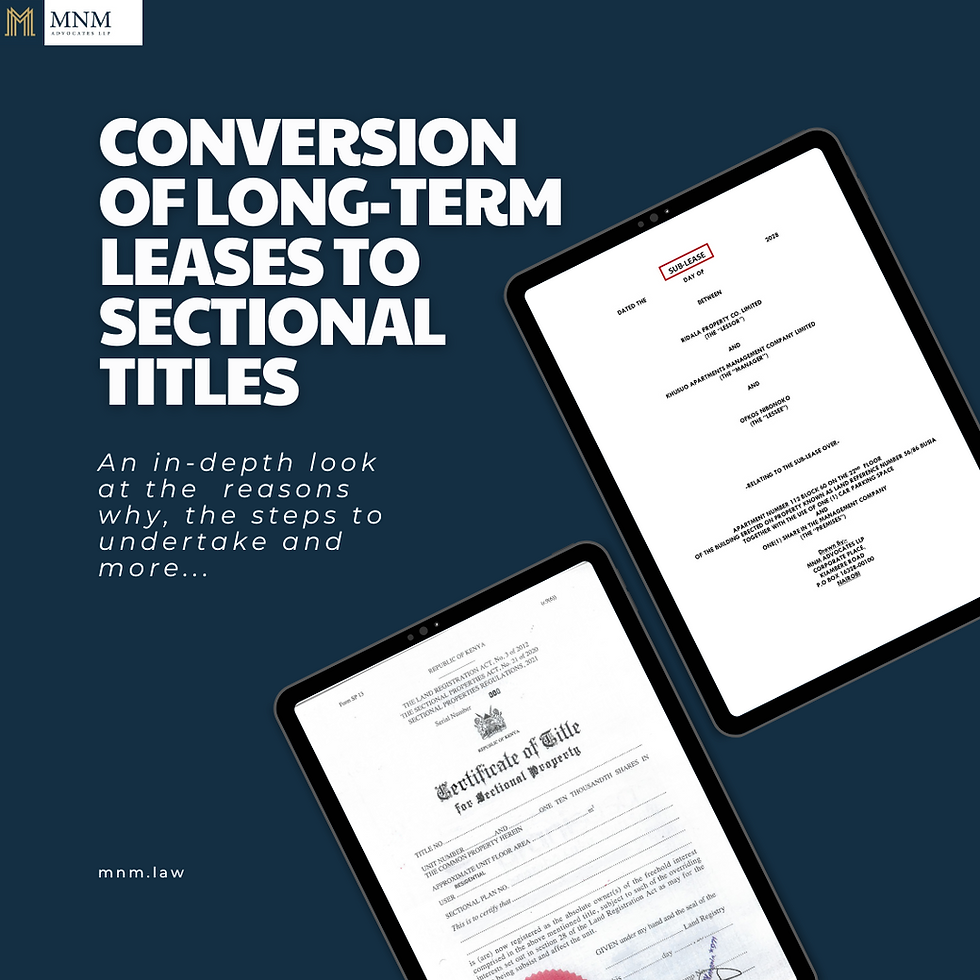Safeguarding Proprietary Interests in Land
- Hannah Wahu

- Sep 12, 2023
- 4 min read
Updated: Sep 18, 2023

Land grabbing is a malignant and deeply rooted problem and, sadly, a familiar tale to land owners in Kenya. Fraudsters are increasingly forging documents and devising schemes aimed at defeating interests landowners have in their property.
In view of this, there are various ways in which land owners can protect themselves from dubious schemes of land grabbers. Let’s check out a few.
Electronic Land Register
On 27th April 2021, the Ministry of Lands and Physical Planning launched the National Land Information Management System commonly known as “ArdhiSasa” which is an electronic system in which the land register is maintained.
The system is programmed with digital security features that protect landowners’ accounts. For instance, it sends the registered proprietor of the land a one-time password (OTP) in real time. This can alert landowners to instances where unscrupulous persons are attempting to log in or undertake any transactions on the platform.
The OTP is a security measure in the accessibility of the system to users. The registered proprietor of the land is required to authorize any land transactions relating to the property and this even extends to application for searches by third parties.
Ideally, once a registered proprietor of land has created an account on the platform, they are required to upload the land ownership titles on the system for verification. Once the title is verified, then the property is listed under the registered proprietors accounts.
This development acts as a foil of the old system of record keeping by the lands office which entailed maintenance of physical files. These files have a tendency to “disappear “, making it easier for tampering with land records.
Up to Date Records Relating To Rates And Rent
In court matters relating to questions on ownership of a property, parties have relied and produced evidence in court on their payment of land rates and rent to the relevant authority in an attempt to prove their case.
It’s common practice in land matters for parties to attach land rent payment receipts as well as land rates payment receipts in their attempts to prove that the records maintained at the relevant office are in their names.
More often than not, land grabbers will collude with rogue county officers in their attempts to alter the records at the county offices. Such efforts ensure that land rent demands are addressed to them. These demands are often the basis upon which they remit land rates to the relevant authority with the hope that they shall rely on the said records in their claims of ownership of a property.
Extension of Leases
In recent times, there have been many cases of land grabbing Nairobi’s upmarket estates. Cartels have been keen to identify leasehold land where the leases are about to expire. There are also instances where the registered proprietor has since passed on and the beneficiaries are unaware of the requirement to put in an application for extension of lease.
In these cases, the cartels collude with other interested parties with the intention of conveying the property to them in the absence of an application for extension of lease by the rightful parties. In others cases, it turns out that there’s duplicity of records to various individuals such that there are several claims of ownership over the same parcel of land.
Ideally, the National Land Commission is required to notify the lessee within five years before the expiry of a lease of the impending expiration. The notification should;
Indicate the date of expiry of the leasehold tenure;
Inform the lessee of his preemptive right to apply for the extension of the lease and to whom to make the application.
However, this requirement is rarely observed and its therefore important for the lessee to keep abreast with the terms of the lease in order to be able to put in an application for extension of the lease.
Claims of Adverse Possession
Registered proprietors of land are advised to maintain physical presence on their land to avert claims of adverse possession. A claim for adverse possession will qualify if the claimant can prove that they have openly been in actual and continuous possession of land for at least Twelve (12) years without consent of the registered proprietor, with the intention to have the land.
Where a registered proprietor of land maintains a physical presence on the land by granting possession to a third party, it’s important that a lease of peppercorn rent (a symbolic fee) is prepared with a view to meet the threshold of consent.
Searches
It’s advisable for a registered Property owner to conduct searches on a yearly basis, with a view towards confirming the current status of their property. Such searches will create a proper record necessary to resolve third party claims. These searches will also assist in identifying the timeline around which the records might have been tampered with.
While purchasing land, the purchaser’s search should extend to a historical search on the land register in order to ascertain previous ownership of the property. It’s important to confirm that the Property is not listed in the Ndung’u Land Report or any other Title Revocation Notices issued by the National Land Commission as an illegally/ irregularly allocated portion of public land.


Comments